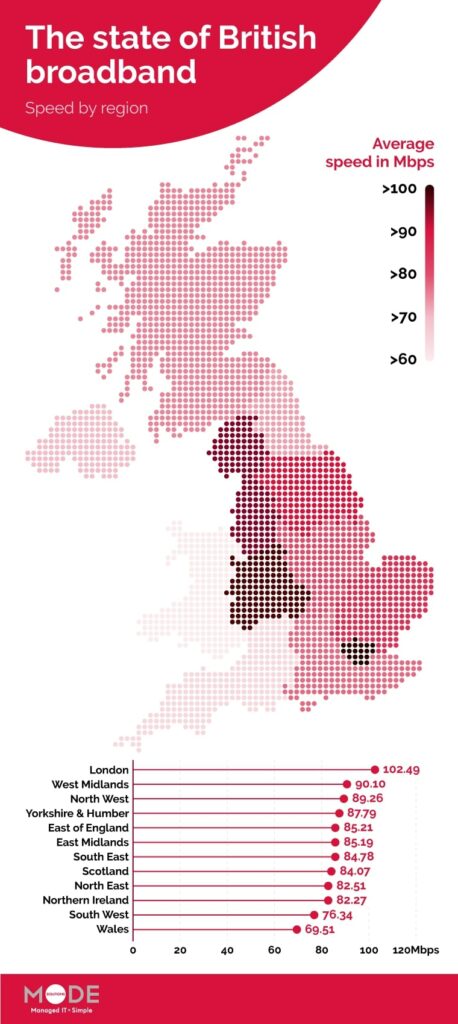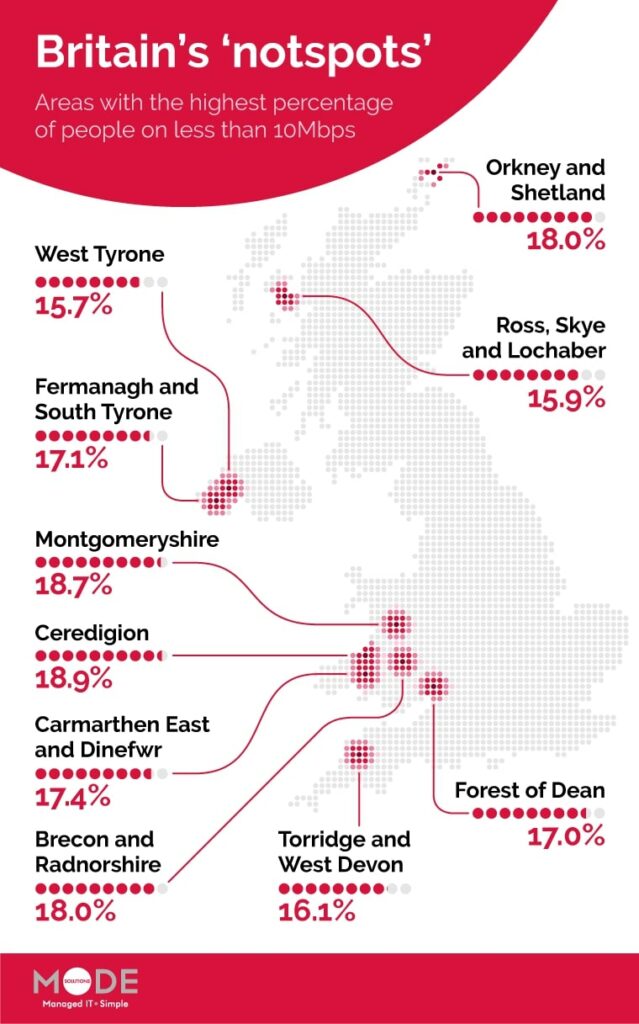Is UK Broadband Ready For Hybrid Working?

Hotspots and Notspots: Is UK broadband infrastructure ready for hybrid working?
How good is UK broadband? Depending on where you live, your options could range from high-speed fibre to a sluggish, intermittent connection. And in today’s working world, those stuck in the latter camp could face major obstacles.
Increasingly, employees are expected to be able to work on a remote or hybrid basis. When the working day is packed with video calls, thousand-row spreadsheets and hefty file downloads, an unreliable broadband connection is a severe disadvantage. Those not blessed with adequate broadband coverage could see their productivity dented.
That’s why we set out to determine the full extent of the UK’s broadband shortcomings. We’ve analysed the data and crunched the numbers, using Ofcom’s Connected Nations dataset to construct a top-down view of the state of UK broadband. From here, we built up a regional picture of connectivity across the UK, ranking the towns with the best and worst broadband coverage. Read on to learn what we found.
Left behind by the remote revolution
Broadband speed now matters more than ever before. And at the root of it all is the COVID-19 pandemic.
Before COVID struck, nine-to-five in the office and the daily commute were non-negotiable aspects of working life for most Brits. However, successive lockdowns laid the groundwork for ‘the new normal’ and it is now standard practice for workplaces to follow a hybrid approach, with employees coming into the office a few days a week and working from home the rest of the time. Some companies have done away with the office entirely, requiring their employees to work on a fully remote basis.
To work from home effectively, you need good broadband. Yet our analysis reveals that one in four workers fall short of the 30 megabits per second (Mbps) required to keep up with the ever-increasing bandwidth demands of modern work. And while there are a few broad geographical patterns to who does and doesn’t have solid connectivity – such as Scotland and Wales on average, being worse off than England – the biggest disparities tend to be town to town, postcode to postcode.
To work from home, you need good broadband. Yet one in four workers fall short of the 30 Mbps required to keep pace with modern workloads.
Though some towns have seen big lifts in connectivity following recent regeneration projects, such as Crawley in the Southeast of England, Nuneaton in the Midlands and Blackburn in the North West, others haven’t had the same luck. Fermanagh in Northern Ireland, Brecon in mid-Wales and Stockton in the Northeast of England are examples of towns in dire need of infrastructure upgrades.
This matters for businesses just as much as it does for individuals. Businesses want access to the best applicants, regardless of location. And individuals shouldn’t have their career options limited by a poor internet connection. Yet for many within the UK, this is the sad reality.
Different sectors, Different speeds
Our research also revealed differences in the bandwidth needs of different industries.
Unsurprisingly, IT & Telecoms comes top of the list, requiring 60 Mbps on average. In second place is the data-rich sector of Financial Services, with Customer Service rounding out the top three.
At the other end of the rankings, we have the Charity & Voluntary sector, which requires just 22.5 Mbps of its average worker. Then, Project Management and Business Development come second and third last respectively.
| Sector | Speed |
|---|---|
| IT & Telecoms | 60 Mbps |
| Financial Services | 48.5 Mbps |
| Customer Service | 47.5 Mbps |
| Medical & Health | 45.5 Mbps |
| Media, Digital & Creative | 33 Mbps |
| Sales | 27.5 Mbps |
| Education & Training | 26 Mbps |
| Business & Development | 25 Mbps |
| Project Management | 23.5 Mbps |
| Charity & Voluntary | 22.5 Mbps |
If you work remotely in an industry with heavy bandwidth requirements and plan to relocate, you may wish to consider the impact of broadband speeds on your productivity and property website Rightmove, can now provide this information. How many video calls will you have to field? Do you have to transfer large files? Will you be logging into a company VPN? The number of people sharing your connection has an impact too – two people working from your home could double the demands on your bandwidth.
Despite this variability between individuals and industries, sky-high speeds are rarely essential. What matters more is that employees have access to good enough broadband that will allow them to complete their tasks without any slowdown.
Yet a considerable chunk of the UK falls short of the bandwidth needed for even the lowest ranking sectors – 7% of the population receives under 10 Mbps. This presents a real barrier to successful remote working, especially when there is no physical office to work from if speed dips even lower.
7% of the UK population receives under 10 Mbps

The picture that emerges from our data analysis is of the highest speeds being clustered around the South of England, with average connection speed dropping the further away you get from London. Average connection speeds in Wales are particularly poor, with the Southwest of England not far behind.

When we look at the location of Britain’s so-called ‘notspots’ – that is, places where usable broadband is hardest to access – we can see that they tend to be in places where the average speed is lower. This is true of the top three: Ceredigion and Montgomeryshire in Wales, and Orkney and Shetland in northern Scotland. Driving this are the various financial, logistical and ecological complexities of developing broadband infrastructure in hard-to-reach spots within these areas.
Will government action save the day?
In March 2021, the UK Government announced its £5bn ‘Project Gigabit’, commiting to deliver next-generation broadband to more than a million hard-to-reach homes. Cambridgeshire, Cornwall, Cumbria, Dorset, Durham, Essex, Northumberland, South Tyneside and Tees Valley are tabled as the first areas to benefit, with 510,000 homes in these locations set to receive speeds of 1000 Mbps – or one Gigabit. Work started in these locations in the first half of 2022. Norfolk, Shropshire, Suffolk, Worcestershire, Hampshire and the Isle of Wight are next in line to benefit.
However, the government has stated that Project Gigabit won’t cover the whole of the UK, with certain remote locations not considered a viable choice for new internet infrastructure. The solution could lie in “new wireless equipment, low orbit satellites or high-altitude platforms to beam faster connections to far-flung homes and businesses” – but this is not within the scope of the scheme. There is also potential for 5G to pick up the slack – although this is a way off. Leading provider EE recently announced that whilst their network covers over half of the UK, it won’t be until 2028 that the entirety of the UK has 5G access.
If you live in a remote location, these words will not offer much hope. And given how difficult it is for individuals and businesses to move from one part of the country to another, disparities in broadband access are becoming a cause of inequality and inefficiency that is hard to ignore. For the digital transformation of the UK to go from dream to reality, this pressing issue must be addressed.
About Espria
In a world permanently altered by COVID-19, Espria provides the crucial hybrid and remote working solutions that enable workforces to collaborate effectively and securely.
Our aim is to make things simple. Simple to understand, simple to manage – a business operation that’s seamless and hassle free. We focus on delivering outstanding services that are also future-proofed. With the right tools, your teams can operate at maximum efficiency whether they’re in the office or working from home.
Additionally, our recent acquisition of IT managed services provider eacs has extended Espria’s geographical reach, helping us provide our full suite of integrated solutions to businesses across the nation. We don’t think location should be an impediment to having top-notch IT systems.
To learn more about Espria or get a quote, contact us today.
Subsribe for updates and our latest research
You may be interested in
Is Your MSP Really Helping You Grow — Or Just Keeping the Lights On?
There’s a moment in every business where the question quietly surfaces: “Are we getting what we really need from our IT provider?” It’s not always easy to answer. On the surface, things seem fine. Tickets are resolved. Reports arrive. There’s someone to call when things go wrong. It’s familiar. It’s comfortable. And that comfort can be deceiving. Because beneath the surface, many organisations are stuck in a service relationship that feels safe — but is actually stagnant. And here’s the truth: comfort isn’t the same as progress. For many, the idea of changing MSPs or challenging the…
The 2025 State of Ransomware: Key Insights on Attacks, Costs, and Recovery
Ransomware continues to evolve — and so must our defenses. The State of Ransomware 2025 report from Sophos presents one of the most comprehensive views yet into how organisations around the world are being impacted by ransomware attacks. Based on an independent survey of 3,400 IT and cybersecurity leaders across 17 countries, the report explores how attacks are evolving, the operational weaknesses adversaries exploit, and the human and financial tolls that follow. Whether you’re building a cybersecurity strategy or assessing risk, this year’s findings offer crucial, real-world insights to guide your response. Key Findings from…
Outgrowing your MSP; businesses need a provider that scales with their growth
To stay competitive, business leaders must align with MSPs that deliver strategic value, drive innovation, and support to scale. Now firmly into 2025, it’s becoming clear what the year has in store for the IT landscape. For SMBs, the message is clear: business growth must be matched with smarter, more scalable managed services. The demand for cyber-resilient, cloud-first and AI-integrated solutions is no longer a forecast – it’s a reality already shaping business priorities. According to leading global technology market analyst firm Canalys’ MSP Trends 2025 report, the MSP model is transforming under growing pressure…
End of windows 10 support signal urgent action needed from UK organisations as cyberattacks continue to rise
Recent breaches at major UK retailers, combined with the approaching end of life of Windows 10, highlights a critical moment for IT resilience planning The recent wave of cyberattacks targeting major UK retailers has highlighted the growing security risks associated with organisations running outdated systems and applications and maintaining weak identity verification protocols. These incidents—particularly those involving Marks & Spencer and the Co-Op—have starkly exposed how vulnerable legacy infrastructure and insufficient access controls can be. In both cases, attackers successfully posed as legitimate employees and manipulated IT help desks into resetting internal passwords, ultimately gaining…
UK SMEs must fortify their cybersecurity against geopolitical risks, says Espria
A recent Sky News investigation highlighted an uptick in cyberattacks tied to the Iran conflict that are targeting businesses across multiple sectors. Speaking at the NATO Summit, Prime Minister Sir Keir Starmer urged UK businesses, regardless of size or sector, to prioritise cybersecurity and ‘take immediate steps to review and strengthen their defences.’ While the warning is timely in tone, businesses are already becoming targets of politically motivated cyberattacks, emphasising the need for heightened vigilance. “As tensions spread globally, threat actors will continue to exploit digital vulnerabilities, and neutral businesses may be caught in the…
Why Businesses Should Invest in ESG: Lessons learned by Espria
In today’s competitive landscape, Environmental, Social and Governance (ESG) performance is no longer just a “nice to have”—it is a critical business imperative. Companies that prioritise ESG are better positioned for long-term success, risk mitigation, and reputation enhancement. Today’s world demands more from companies than just financial performance. Customers want transparency. Employees want purpose. Investors want resilience. ESG helps businesses manage risk, seize new opportunities and build trust with the people who matter most. It is how you can stay competitive, stay responsible and stay relevant in a fast-changing world. A powerful case study of…





